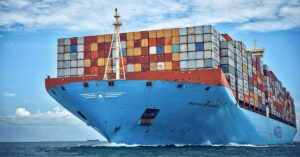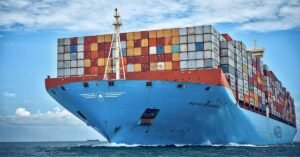
Watch: Towboat Narrowly Avoids Collision With Historic Steamboat On The Mississippi River
May 7, 2024
Montrose Port Authority Launches Scotland’s First Shore Power Facility
May 7, 2024

A.P. Moller-Maersk (Maersk), the second-largest ocean carrier in the world, says it will continue rerouting its vessels via the Cape of Good Hope owing to Houthi attacks.
This will be the way forward for the “foreseeable future”. The firm also issued an official update to the customers detailing the issues it is encountering and its actions to combat the effects of shipping-related disruptions.
Maersk added that the situation in the Red Sea has become more complicated over the recent months, prompting the firm to reroute to enable the safety of its crew members, cargo, and vessels.
With the risk zone expanding and brutal attacks reaching further offshore, vessels are compelled to take longer routes, resulting in additional time and costs.
Maersk spoke of the unexpected development causing bottlenecks, vessel bunching, shortages in its equipment and capacity, and delays.
The shipping major further estimates an industry-wide capacity loss of 15% to 20% in the Far East to North Europe and Mediterranean market for the second quarter.
The firm is improving sailing speeds and adding more capacity to enhance reliability.
Maersk has also leased more than 1,25,000 additional containers to satisfy customer demands.
While spot rates have increased and remain significantly higher than a year ago, costs have also increased.
Owing to longer journeys, augmented sailing speeds, and additional fuel costs have led to surcharges that have been passed to the shippers.
For example, Maersk informed that fuel usage per journey had increased by 40%, with charter rates currently three times higher, typically fixed for five years.
Maesrk reported that while it has recently lowered the Peak Season Surcharge, it has been raised again to cover additional costs.
The company will continue reviewing the surcharges and update if there are changes.
Last week, after a strong start, Maersk reportedly raised the lower end of its financial guidance for this year, largely due to ship reroutings and stronger-than-expected demands.
The update comes as Israel initiated a military operation against Hamas in Rafah, situated in southern Gaza on the border with Egypt.
The Houthis on Friday threatened to escalate attacks on shipping in response to an Israeli attack on the city, pledging to levy sanctions on all vessels and firms that supply and enter Israel’s ports, irrespective of nationality or destination.
On Monday, the U.S. Central Command said that its forces successfully shot down an uncrewed aerial system fired by the Iranian-supported Houthis over the waters of the Red Sea.
Last week, the Houthis threatened to begin targeting vessels in the eastern Mediterranean Sea following the launching of a UAS targeting an MSC container vessel in the Indian Ocean about 300 nm to the southeast of the Horn of Africa.
The attack, which caused minor damages, is understood to be the group’s first outside the Gulf of Aden and the Red Sea.
Reference: Maersk
Maersk To Continue Rerouting Its Ships As Houthi Ship Attacks Continue In The Red Sea appeared first on Marine Insight – The Maritime Industry Guide
Source: Maritime Shipping News


